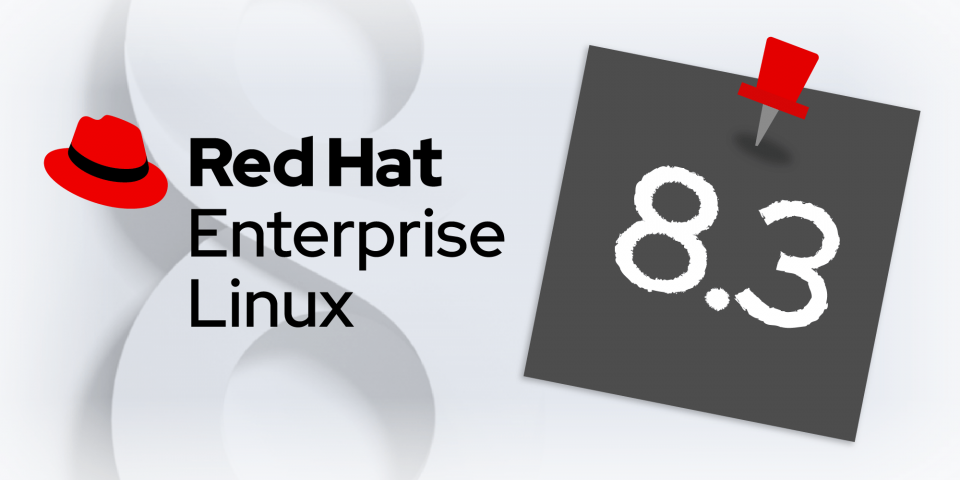Red Hat Enterprise Linux (RHEL) 8.3 was announced last week and is now generally available. We encourage Linux developers to download this update and give it a try. We also recommend updating both development and production systems to the new 8.3 release. This article is an overview of the developer highlights of RHEL 8.3, including new application streams for Node.js 14, Ruby 2.7, PHP 7.4, GCC Toolset 10, and more.
What's new in RHEL 8.3?
RHEL 8.3 delivers on RHEL 8's promise by providing a secure and consistent foundation for the open hybrid cloud. Feature enhancements in this update help developers deliver services and workloads faster and with less effort—for any application on any footprint at any time.
Here are some of the new RHEL 8.3 features designed to assist developers in getting to the cloud, the edge, and beyond:
- Application streams help developers innovate using supported versions of the latest tools without sacrificing the earlier versions required for application maintenance. RHEL 8.3 includes application streams for Node.js 14, Ruby 2.7, PHP 7.4, GCC Toolset 10, and more.
- Podman Remote API 2.0 makes it easy for organizations to retain code and tooling that previously relied on the Docker container engine in RHEL 7.
- Containerized RHEL container tools increase flexibility by letting developers use Buildah, Skopeo, and Podman to build and run standard compliant (Open Container Initiative) container images.
- Image Builder push-to-cloud lets admins build customized machine images and automatically upload them to a cloud provider’s inventory.
- In-place upgrades for the cloud simplify lifecycle management for cloud deployments by supporting in-place upgrades from RHEL 7 to RHEL 8.
New application streams in RHEL 8.3
RHEL 8.3 includes the following developer tools updates, which are available as application streams:
- GCC Toolset 10: A curated collection of compilers, toolchains, debuggers, and other critical development tools. The foundation of Red Hat Developer Toolset 10, GNU Compiler Collection (GCC) 10.2.1 is the newest update of the popular open source compiler collection. GCC Toolset 10 also updates debugging and performance tools for C/C++ and Fortran.
- Go Toolset, LLVM Toolset, and Rust Toolset: These popular compilers are available with new features in the latest version update.
- Node.js 14: Introduces an upgraded V8 engine, a new experimental WebAssembly System Interface (WASI), experimental Async Local Storage API, and numerous bug and security fixes.
- Nginx 1.18: This version of the popular web and proxy server provides bug fixes, security fixes, new features, and enhancements over Nginx 1.16. Nginx 1.18 includes enhancements to the HTTP request rate and connection limiting and new proxy protocol variables.
- Git 2.27: Adds numerous features for developers, such as switch and restore commands, configuration variables, and options for configuring SSL for communication with proxies.
- Ruby 2.7: Brings performance improvements, bug and security fixes, and new features, including a compaction garbage collector and multi-line editing in the Interactive Ruby Shell.
- PHP 7.4: Bug fixes and enhancements include the new Foreign Function Interface (FFI), an experimental extension that enables calling native functions, accessing native variables, and creating and accessing data structures defined in C libraries.
- Perl 5.30: Adds new features and deprecates or removes several modules.
All of the new RHEL 8.3 application streams are available as Red Hat Certified Containers through the Red Hat Ecosystem Catalog. Our goal is to make it easy to build and deploy mission-critical applications using the supported application streams for Red Hat Enterprise Linux and Red Hat OpenShift environments.
For more information, please read the comprehensive RHEL 8.3 release notes.
Start using RHEL 8.3 today
Red Hat Enterprise Linux 8.3 continues to offer customer choice in terms of the underlying compute architecture, with availability across x86_64, ppc64le, s390x, and aarch64 hardware. If you are a developer with an active subscription, you can access RHEL 8.3 through the Red Hat Enterprise Linux downloads page. If you are new to Red Hat Enterprise Linux, you can use the downloads page to register and download Red Hat Enterprise Linux for developers.
Last updated: November 17, 2020
